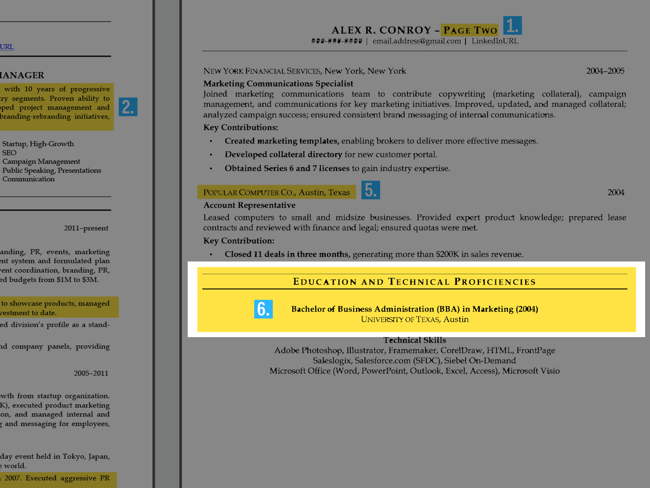
How to write a CV in English
If you have a lot of working experience, this does not mean that your CV is attractive to the employer.
Your self-confidence and experience are not enough for a CV to attract the attention of an employer. If a CV does not have a clear structure of information, presentation, if it does not describe those sides of you that it should etc. – no one is going to be engaged in a detailed study of your biography and spend precious time looking for this very experience.
Amanda Augustine, who is a career development consultant for TopResume, told Business Insider what to her mind is most important on a CV sent by a middle manager. She helped to compose a good CV template, but noted that some items may be significantly different depending on the specification of your business sphere. Nevertheless, this manual can serve as a good instance for professionals with approximately ten years of experience.
There are six main tips, focusing on which you should compose your ideal CV (both - in terms of form and content).
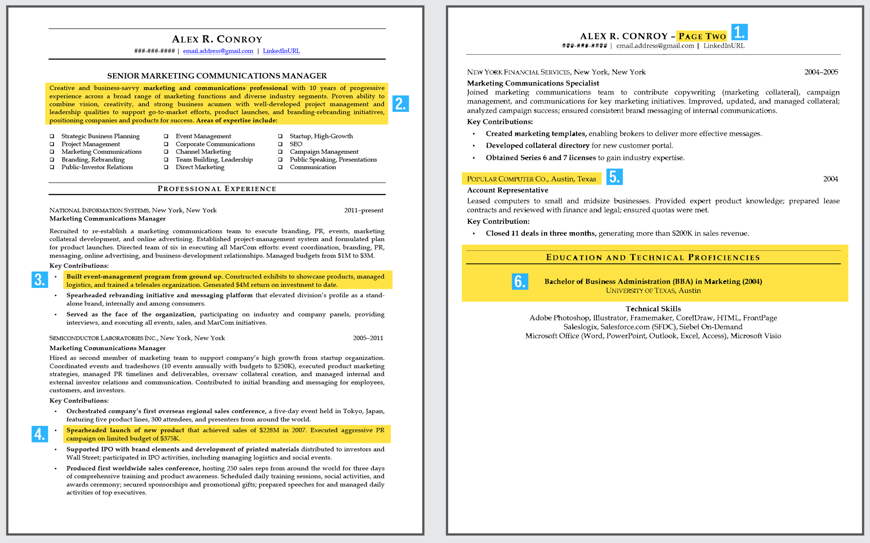
Tip 1: Briefness is not always the sign of talent
If you have been working for more than a year, most likely that you have switched more than one position or even a place of work. You should not be too modest and cut down on the text of the CV. The information about the current and recent work experience should occupy the first place – the experience will characterize you as a professional for a future employer or HR manager.
It is better not to put the title of the CV - not only on the title page, but also on the next page - thus, you once again draw the attention of the person reading the CV to your name, surname and specialization. You should also include your contacts in the title so that if they decide to call you, they don’t waste time looking for a phone number, and there is no risk of forgetting about the call.
|
The selected text: Page Two |
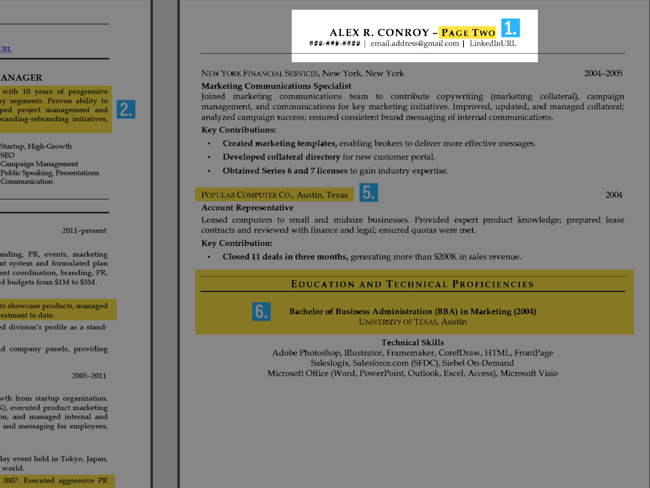
Tip 2: List your skills and professional skills at the very beginning of the text
In the CV, that Amanda Augustine cited as an example, there is a whole list of competences, knowledge and skills, which is entitled as "Areas of expertise". Such a list should accompany any CV, regardless of the industry in which you work or intend to work.
The areas of expertise section, found at the very beginning of the CV, is needed for the following purposes:
First of all, it helps in cases where CVs are not read, but quickly scrolled through (namely, this is how large companies selecte candidates for good positions). Then HR will be able to stumble upon such a list during a quick scan, and they will catch their eye on it and the information indicated in it. Besides, this section will give a quick and clear idea of what level of specialist is on the other side of the text.
Secondly, the decision to insert a list of your professional abilities provides automatic filters with something to work with. According to statistics, CVs that have such a section are much more likely to pass the primary selection, which is carried out by special employee search programs.
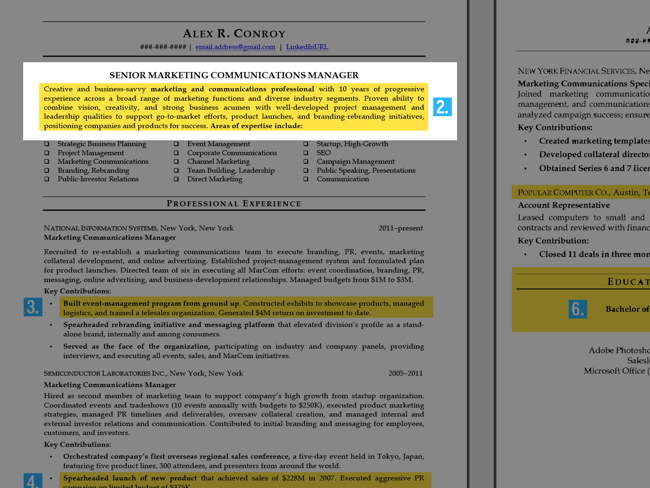
|
The selected text: Creative and business savvy marketing and communications professional with 10 years of progressive experience across a broad range of marketing functions and diverse industry segments. Proven ability to combine vision, creativity, and strong business acumen with well-developed project management and leadership qualities to support go-to-market efforts, product launches, and branding-rebranding initiatives, positioning companies and products for success. Areas of expertise include: |
Tip 3: Describe each significant position in detail
Each more or less significant position that you have occupied on your career path should have at least a small, but capacious and informative description. Describe the functions that you performed in a particular position, note the outstanding achievements that you made while in this position, and so on.
Additionally, make another list in which you summarize your main and greatest career achievements during your work. It can be a huge and successful advertising campaign, a major deal, the development of a considerable project, and so on (you should think carefully about what achievements in your sphere you could name).
|
The selected text: Built event-management program from ground up. Constructed exhibits to showcase products, managed logistics, and trained a telesales organization. Generated $4M return on investment to date. |
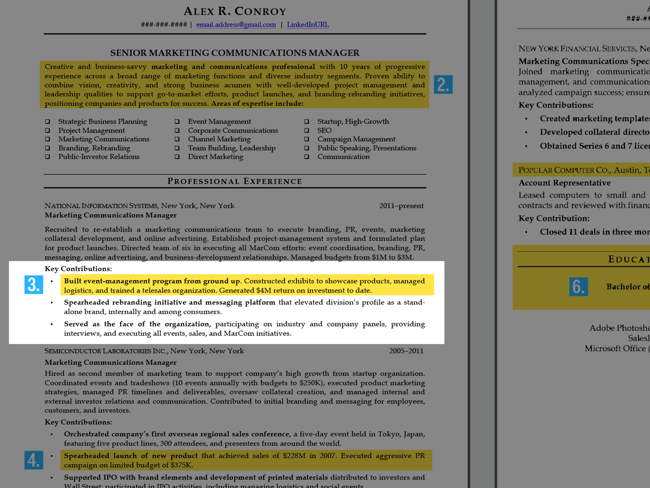
Tip 4: Avoid qualitative type descriptions in favour of quantitative ones
If you are describing your achievements (for example, for the list from Tip 3), then do not use quality adjectives if possible: major sales, large workshop, many events.
Instead, write specific information with numbers: it is the numbers that are the first to catch the attention when reviewing. For example: organized a USD 20 000 sale of a product; supervised a workshop with a total of 36 employees and so on.
|
The selected text: Spearheaded launch of new product that achieved sales of $228M in 2007. Executed aggressive PR campaign on limited budget of $375K. |
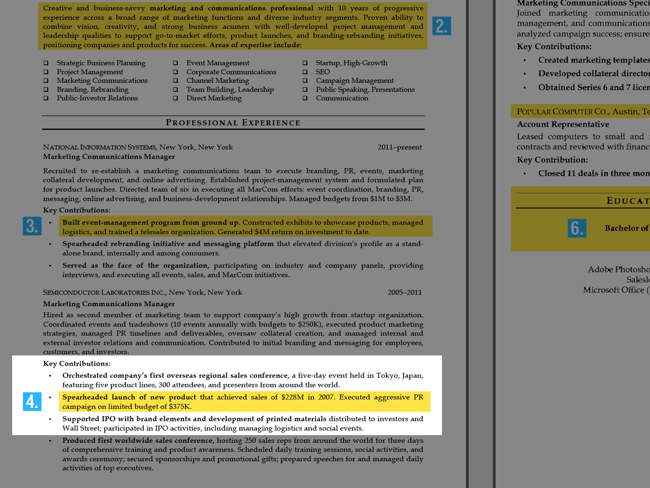
Tip 5: List more than only recent positions
Let the employer see the potential in you. It is worth indicating the places of work and positions in reverse chronological order, from the most recent to the very first. Certainly, the most attention should be paid to the current position and two or three previous ones. But even earlier occupations should not be ignored. This gives you the opportunity to see how you learned, progressed and developed professionally: the budgets entrusted to you grew; projects were enlarged; the number of employees under your supervision increased, etc.
|
The selected text: FOOD & BEVERAGE MANUFACTURER, CHARLESTON, SC Pre-Sales Account Representative |
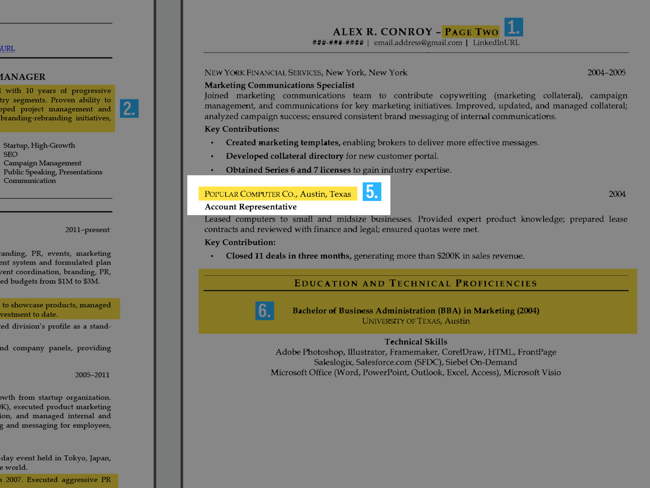
Tip 6: Move education information to the end of your CV
This advice is relevant for those who graduated and began their careers more than 3 years ago. After university or college, the main method of attracting the attention of the employer is the name of the educational institution and the diploma. But if you already have experience, it is better to pay more attention to work skills and competences.
|
The selected text: Bachelor of Business Administration (BBA) in Marketing (2004) UNIVERSITY OF SOUTH CAROLINA, Columbia, SC |
